Editor's Note: Today we have another post from returning guest author Pankaj Mondal. In his previous post, Pankaj helped us learn how to test the merits of SEO for our organization and explained why SEO is a worthy investment.
In this post Pankaj will build on that by sharing how you can leverage social media to boost your SEO efforts.
The floor is yours Pankaj!
SEO is critical for success in a growing and crowded online environment where competition is extremely fierce.
But what do you prioritize when trying to improve SEO?
Google has confirmed that content and links are the two primary factors for ranking websites in search, so building quality content and securing worthwhile links is essential. However, you may be surprised to know that various tactics you implement on social media could help improve organization-wide SEO efforts as well.
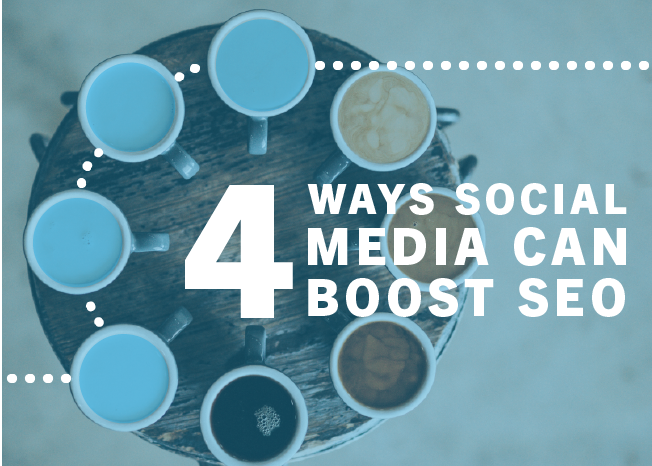
Despite the fact that Google has told us repeatedly that social media signals are not used directly as a ranking factor in search, there are other ways social media can influence SEO. In fact, more and more webmasters are diverting their attention from link building to get more followers and likes on social media.
Not convinced?
Check out this study from CognitiveSEO which explores the correlation between social signals and search visibility. While social signals may not be a direct ranking factor in Google’s search algorithm, there is still a strong correlation between positive social signals and search success and you should account for social within your SEO program.
Let’s look at how social media can bring more visitors to your website and improve overall SEO.
1. Content Promotion
Social media can help your website rank through content promotion.
One of the most core functions of social media is content sharing — it’s the primary way users engage with social media sites. Irrespective of whether it’s through photos, live streaming, or videos, it’s some form of content.
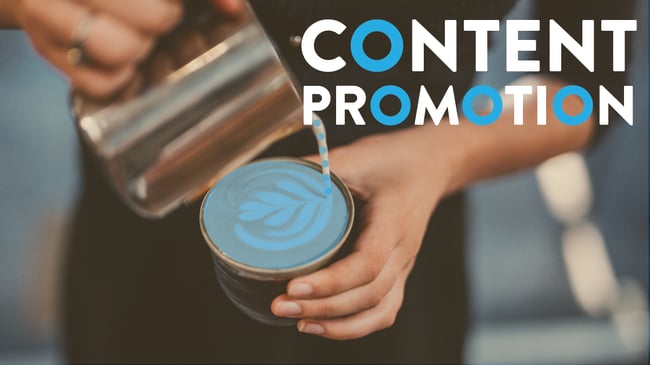
If you’re producing great content, but it doesn’t reach your audience, all your hard work proves to be futile. And, if your site is technically sound from an SEO perspective, it's time to try other methods.
This is where social media plays a critical role: it empowers you to promote your quality content on news channels and to a fresh audience, giving a boost to your brand.
While the links from your social shares may not have the same SEO value as backlinks from authoritative websites, they can influence on-site engagement and bounce rate. If you produce killer content, people will stick to it, and the resulting engagement metrics will send positive signals to search engines.
Google reviews bounce rates while sorting rankings because high bounce rates usually indicate that a site has a poor user experience. If a user lands on your webpage from search but immediately bounces, it indicates the content is probably not useful and your page might not be a good result for that search.
There’s no better way to improve your site’s authority than giving your audience a high quality experience, and that comes by delivering killer content. Social media provides another channel to deliver that content.
2. Brand Awareness
Social media also helps boost brand awareness.
In 2016, Stickyeyes, a UK-based SEO company, performed an experiment to find if brand awareness had any impact on organic search rankings. While they abstained from stating that brand awareness boosts organic search rankings, they confirmed that there is a correlation between strong brands and search performance.
In June 2017, SEMrush published a report that perused over 600 keywords to shed light on what actually impacts search results. It was interesting to note that the number one ranking factor was direct traffic to a website — direct traffic usually correlates with brand recognition as these people are already aware of your website.
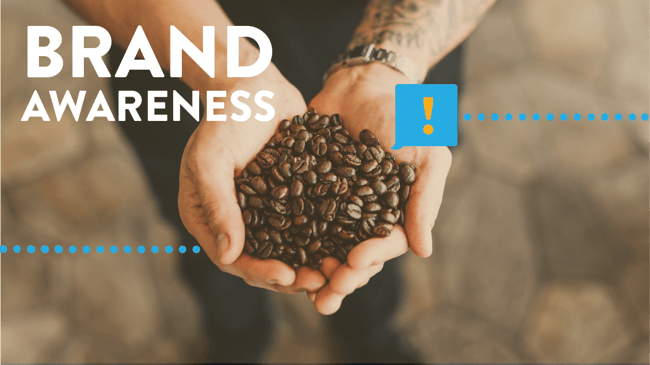
Of course, people will have to see your brand name and products many times before they go directly to your site, rather than entering a search query.
Social media is the perfect tool to grow your brand awareness because it offers direct access to your target audience. Posting helpful content, responding to questions or concerns, and participating in community conversations all help build brand awareness. Also, paid options such as advertisements and sponsored posts provide an opportunity to reach an even larger, but still targeted, audience.
If you don’t have the time or resources to post content on a regular basis, you can lean on tools like:
Best practices dictate posting a few times a day, but conversing and engaging with your audience will be the most important activity for growing brand awareness.
Another best practice is to limit the number of social media icons. Research from Quick Sprout shows an increase in shares when the number of icons was reduced.
By identifying your social media audience it also makes it easy to target them with relevant ads through PPC and increase brand awareness even further.
3. Local Engagement
Social platforms also provide an opportunity to engage with local communities, eventually sending local-specific authority signals to search engines.
This can be accomplished in a variety of ways, but the two easiest are interacting with local brands on social media and using social media to promote your involvement in local events.

To engage with local brands, research the brands in your area and find local companies that share your ideas and beliefs. Some potential ways to engage include sharing each other’s important updates, hosting live discussions, and guest blogging on each other’s websites and promoting the posts on social media.
Whenever you participate in a local event, trade show, or festival, take pictures or create enticing videos and make a post about your experience. Share your post on social media and be sure to invite the event participants and other local residents to engage.
If you have a blog, start creating locally-relevant content to attract local audiences. You can also include Q&A-styled content that targets voice search queries that can help you rank for common local search queries like [Best restaurants in New York] or [Which is the best Chinese restaurant in San Diego].
If you’re a local business, local SEO should be a top priority. Social media can help attract local visitors to your site and send positive signals to search engines.
4. Link Building
Social media also encourages external sites to link to your content.
The key to this is that you need to have authoritative, high-quality content or you’ll have nothing to entice people to link. These types of pages and content are commonly referred to as linkable assets and you can leverage social media to gain more exposure for your assets.
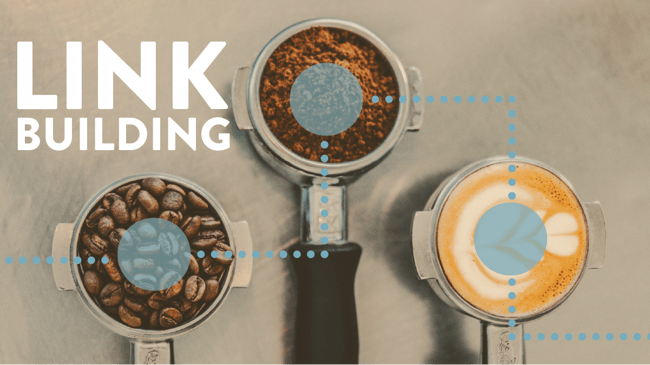
In fact, SEO PowerSuite recently conducted a study of 628 SEO experts on their link building strategy that showed most specialists use social media for link building:
- 53% have experimented with viral campaigns like contests and giveaways.
- 81% share their content on social media.
- 88% include links in social media profiles.
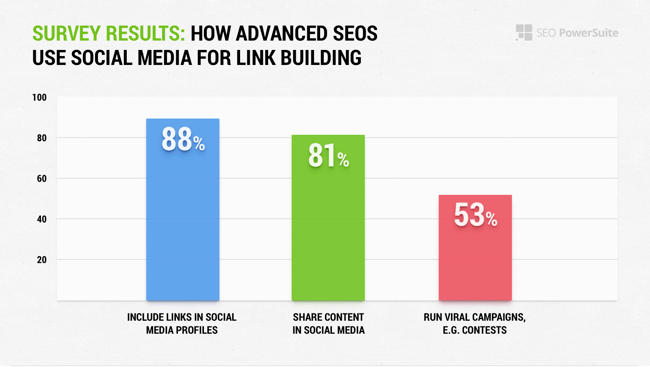
Social media is often ignored for SEO purposes because links from social platforms are rel=nofollow. However, you cannot ignore the traffic that comes from the social links.
You can also use social media to make networking and outreach for link building a little easier. Try using social media sites to find link prospecting opportunities and to build relationships with other people and businesses that are active in your industry. Social media can be a great alternative to more traditional email outreach for link building, allowing you to connect with people outside of their busy inboxes.
For more on social media and link building, check out Matthew Woodward’s tutorial on 28 Social Media Backlinks To Increase Your Rankings.
Wrapping Up
Social media may not be a direct ranking factor, but if you ignore it completely you’re making a huge mistake. Successful online marketing depends on a strategy that accounts for and appropriately prioritizes all of your opportunities. When two marketing channels are as closely aligned as SEO and social media, you do yourself a disservice if you fail to account for how one impacts the other.
Social media can help with promoting your content and brand, earning backlinks, and your overall SEO endeavors. With these tips in mind you’ll have an easier time managing your social media strategy while boosting your SEO simultaneously.
Do you have any other ideas on how social media can support SEO? Let us know in the comments below!

